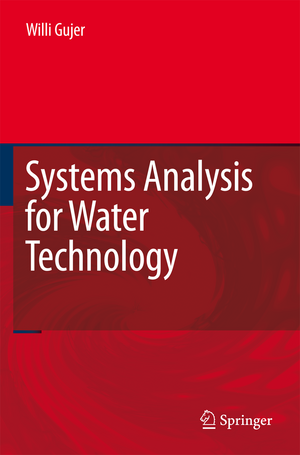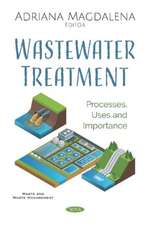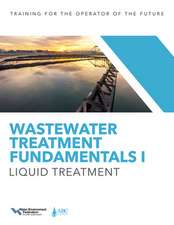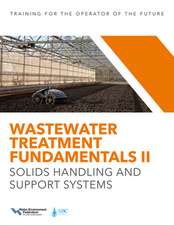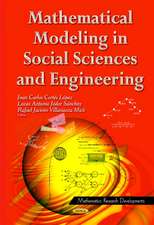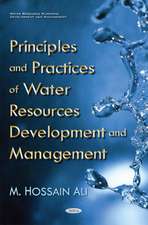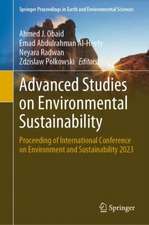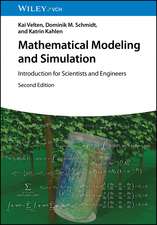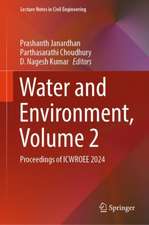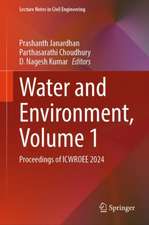Systems Analysis for Water Technology
Autor Willi Gujeren Limba Engleză Hardback – 19 aug 2008
| Toate formatele și edițiile | Preț | Express |
|---|---|---|
| Paperback (1) | 624.14 lei 6-8 săpt. | |
| Springer Berlin, Heidelberg – 18 oct 2010 | 624.14 lei 6-8 săpt. | |
| Hardback (1) | 868.85 lei 3-5 săpt. | |
| Springer Berlin, Heidelberg – 19 aug 2008 | 868.85 lei 3-5 săpt. |
Preț: 868.85 lei
Preț vechi: 1059.57 lei
-18%
Puncte Express: 1303
Preț estimativ în valută:
153.62€ • 182.29$ • 133.57£
153.62€ • 182.29$ • 133.57£
Carte disponibilă
Livrare economică 11-25 martie
Specificații
ISBN-13: 9783540772774
ISBN-10: 3540772774
Pagini: 432
Ilustrații: XIV, 462 p. 256 illus.
Dimensiuni: 155 x 235 x 56 mm
Greutate: 0.82 kg
Ediția:2008
Editura: Springer Berlin, Heidelberg
Colecția Springer
Locul publicării:Berlin, Heidelberg, Germany
ISBN-10: 3540772774
Pagini: 432
Ilustrații: XIV, 462 p. 256 illus.
Dimensiuni: 155 x 235 x 56 mm
Greutate: 0.82 kg
Ediția:2008
Editura: Springer Berlin, Heidelberg
Colecția Springer
Locul publicării:Berlin, Heidelberg, Germany
Public țintă
Professional/practitionerDescriere
This book has a rather long history. It goes back to 1980, when environmental engineering evolved from sanitary engineering as a new and broader engineering discipline. I had the assignment to teach a course in mathematical modeling of technical systems as part of a new postgraduate course in Urban Water Mana- ment and Water Pollution Control at ETH in Zurich. I decided to teach this course on a rather abstract level, with the goal of introducing methods that are generally applicable across the different disciplines of what was then defined as envir- mental engineering. Now I teach a graduate course in methods for urban water management, which heavily relies on the material I compiled in the 1980s. This course is offered in the first semester of the master education in environmental engineering at ETH; it requires four hours of lecturing and problem sessions a week during one semester. The students earn six credit units (ECTS). Of all the engineering disciplines, environmental engineering appears to be among those that maintain the most intimate contacts with the natural science disciplines. Only a detailed understanding of chemical, physical, and microbial processes will lead to engineered systems that fulfill the requirements of society and the environment and at the same time do not require excessive economic and natural resources.
Cuprins
Modeling and Simulation.- System Boundaries and Material Balances.- Transport Processes.- Transformation Processes.- Ideal Reactors.- Hydraulic Residence Time Distribution.- Modeling of Real Reactors.- Heterogeneous Systems.- Dynamic Behavior of Reactors.- Measurement and Measurement Uncertainty.- Parameter Identification, Sensitivity and Error Propagation.- Process Control Engineering.- Time Series Analysis.- Design under Uncertainty.- Problems.
Notă biografică
Prof. Dr. Willi Gujer received his first degree in Civil Engineering from ETH Zurich and later obtained his MS and PhD degrees in Sanitary Engineering from UC Berkeley. Until 1994 he was the head of the engineering department of Eawag (the Swiss Federal Institute of Aquatic Science and Technology). Since 1992 he has served as Professor for Urban Water Management at ETH Zurich. He has published more than 130 scientific papers and is listed as a highly cited author in environmental engineering. His primary research topic is the mathematical modelling of biological wastewater treatment.
Textul de pe ultima copertă
This book presents in a concise format the methods used to develop mathematical models for water and wastewater treatment. It provides a systematic approach to mass balances, transport and transformation processes, kinetics, stoichiometry, reactor hydraulics, residence time distribution, heterogeneous systems, and the dynamic behaviour of reactors. In addition it includes an introduction to parameter identification, error analysis, error propagation, process control, time series analysis, stochastic modelling and probabilistic design. Written as a textbook it is primarily intended to support graduate and doctoral students in environmental engineering, but may also serve as a valuable resource for academics and practitioners alike.
Caracteristici
Systematic and fundamental introduction into mathematical modelling
Many solved practical applications
Includes supplementary material: sn.pub/extras
Many solved practical applications
Includes supplementary material: sn.pub/extras
